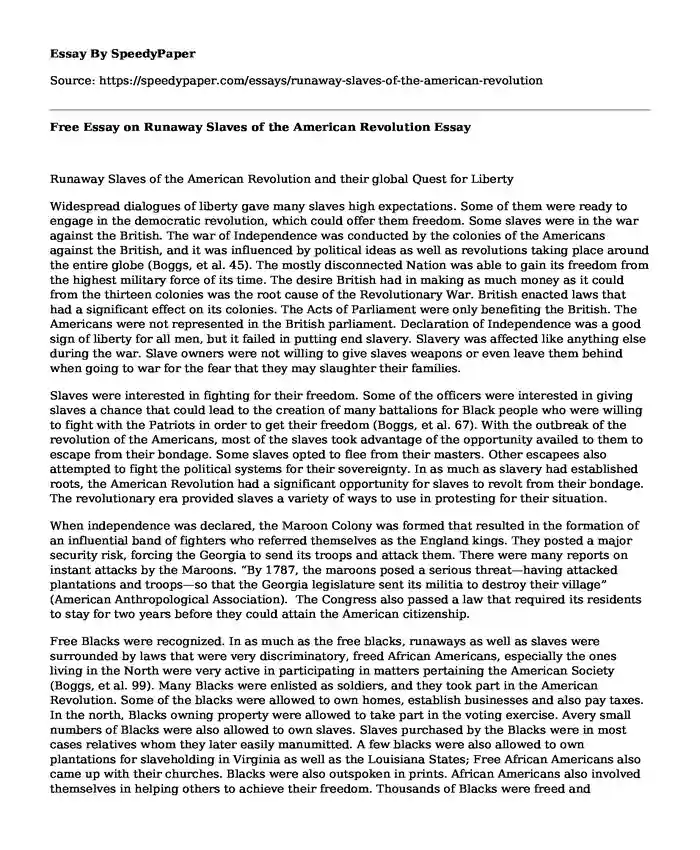
| Type of paper: | Essay |
| Categories: | History United States Slavery American revolution |
| Pages: | 3 |
| Wordcount: | 678 words |
Runaway Slaves of the American Revolution and their global Quest for Liberty
Widespread dialogues of liberty gave many slaves high expectations. Some of them were ready to engage in the democratic revolution, which could offer them freedom. Some slaves were in the war against the British. The war of Independence was conducted by the colonies of the Americans against the British, and it was influenced by political ideas as well as revolutions taking place around the entire globe (Boggs, et al. 45). The mostly disconnected Nation was able to gain its freedom from the highest military force of its time. The desire British had in making as much money as it could from the thirteen colonies was the root cause of the Revolutionary War. British enacted laws that had a significant effect on its colonies. The Acts of Parliament were only benefiting the British. The Americans were not represented in the British parliament. Declaration of Independence was a good sign of liberty for all men, but it failed in putting end slavery. Slavery was affected like anything else during the war. Slave owners were not willing to give slaves weapons or even leave them behind when going to war for the fear that they may slaughter their families.
Slaves were interested in fighting for their freedom. Some of the officers were interested in giving slaves a chance that could lead to the creation of many battalions for Black people who were willing to fight with the Patriots in order to get their freedom (Boggs, et al. 67). With the outbreak of the revolution of the Americans, most of the slaves took advantage of the opportunity availed to them to escape from their bondage. Some slaves opted to flee from their masters. Other escapees also attempted to fight the political systems for their sovereignty. In as much as slavery had established roots, the American Revolution had a significant opportunity for slaves to revolt from their bondage. The revolutionary era provided slaves a variety of ways to use in protesting for their situation.
When independence was declared, the Maroon Colony was formed that resulted in the formation of an influential band of fighters who referred themselves as the England kings. They posted a major security risk, forcing the Georgia to send its troops and attack them. There were many reports on instant attacks by the Maroons. “By 1787, the maroons posed a serious threat—having attacked plantations and troops—so that the Georgia legislature sent its militia to destroy their village” (American Anthropological Association). The Congress also passed a law that required its residents to stay for two years before they could attain the American citizenship.
Free Blacks were recognized. In as much as the free blacks, runaways as well as slaves were surrounded by laws that were very discriminatory, freed African Americans, especially the ones living in the North were very active in participating in matters pertaining the American Society (Boggs, et al. 99). Many Blacks were enlisted as soldiers, and they took part in the American Revolution. Some of the blacks were allowed to own homes, establish businesses and also pay taxes. In the north, Blacks owning property were allowed to take part in the voting exercise. Avery small numbers of Blacks were also allowed to own slaves. Slaves purchased by the Blacks were in most cases relatives whom they later easily manumitted. A few blacks were also allowed to own plantations for slaveholding in Virginia as well as the Louisiana States; Free African Americans also came up with their churches. Blacks were also outspoken in prints. African Americans also involved themselves in helping others to achieve their freedom. Thousands of Blacks were freed and contributed to return to Africa by the whites who were interested in helping them
Works Cited
American Anthropological Association. "RACE - History - The Paradox of Freedom and Slavery." 2007, www.understandingrace.org/history/gov/paradox.html.
Boggs, Grace L, et al. The Next American Revolution: Sustainable Activism for the Twenty-First Century. U of California P, 2012.
Cite this page
Free Essay on Runaway Slaves of the American Revolution. (2017, Nov 15). Retrieved from https://speedypaper.com/essays/runaway-slaves-of-the-american-revolution
Request Removal
If you are the original author of this essay and no longer wish to have it published on the SpeedyPaper website, please click below to request its removal:
- NBU Business Model Essay Example
- Check the Case Study of a Patient with Back Pain in This Free Essay
- Free Essay with Tobacco Industry Environmental Analysis
- Essay Example Dedicated to Nursing Quality and Patient Safety Committee
- Free Essay with the Review of Chapter 10: Advertising Whiteness
- Free essay: The Portrayal of Indigenous People in the Media
- Essay Example on Aristotle Biography
Popular categories




